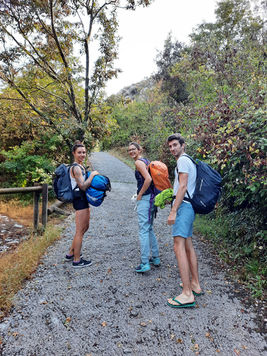
About me
I’ve always been open-minded and curious, eager to explore new experiences. I tend to lose interest in repetitive routines, which is why I’ve often shifted hobbies and career paths over the years. People used to say I wouldn’t stick with anything long-term. Yet, here I am, over 10 years into my climbing journey—and it’s still my passion.
I am excited to finally realizing my dream of starting my own climbing school. It’s a true joy to share my passion, experience, and skills with others. Here I can finally use all the skills I have acquired through my personal and professional experience to help others on their climbing journey.
I've been a certified sport climbing instructor since 2018. Over the past few years, I've gained valuable experience working at various climbing gyms across Austria.
Additionally, my work with Climb Istria and Flyrama has provided me with hands-on experience in teaching outdoor rock climbing.
"Why should you choose me as your guide or coach?" - To answer this question, I'd like to quote a friend of mine:
In short, if I had to choose three key qualities that describe me and give you a sense of what you can expect when we climb together, they would be:
-
Authenticity – I believe in creating an open and genuine atmosphere, making sure you feel comfortable and at ease while pushing your limits.
-
Full Presence – When we're outdoors on the rock, I’m with you every step of the way. You’ll have my undivided attention, ensuring that you get the most out of each moment of our climb.
-
Safety through Clear and Calm Communication – Your safety is my priority. I communicate clearly and calmly, giving you the confidence to focus on the climb while knowing you're in good hands
Sports climbing is much more than just a sport to me; it is a tool for overcoming the various challenges life presents. This is why I chose to write my Master's thesis in social work on this topic. If you're interested, click here to read the abstract of my Master's thesis.
Abstract
"The roots of sports social work can be traced back to the U.S. settlement movement that began around 1900. Since then, sport has experienced a steady upward trend in the psychosocial field and sportive methods constantly gained recognition. In the 1980s, sport-related measures started to become systematically implemented in social work. Today, sports social work is an established term in scientific discourse. Nevertheless, the criticism of the inadequate methodological justification and the lack of conceptual fundamentals is not unfounded. This master thesis therefore tries to establish the medium of climbing for social work on a professional level through a methodological and theoretical foundation. First, the classical methods of social work are explained and cross connections to climbing are shown. For the concrete methodological justification of climbing as a medium, the concept of empowerment and life coping, as well as the method of experiential education are used. This thesis focuses on the competencies that can be acquired through climbing that can be used by social work clients to successfully cope with the challenges of everyday life. Based on selected climbing-specific practical examples, possible conceptual foundations in different areas are addressed. Following the comprehensive discussion of the potential of climbing as a medium, barriers are identified that make the use of the medium difficult. These include the problem of funding on an individual and institutional level, the necessary extraordinarily high level of qualification of the person providing instructions, and the negative effects of exaggerated pressure to perform in climbing. Based on the elaboration, recommended actions for social work on different levels are suggested to contribute to the establishment of climbing as a medium in social work."









